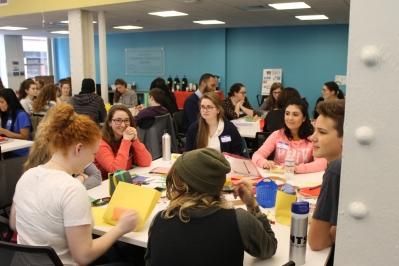
Women's and gender studies provides students with an understanding of the status of women in various cultures and historical eras, in the nexus of race, class, sexuality, religious and disability studies. Students learn the use of gender as a category of analysis and increase their knowledge of women's contributions to many fields. Women's and gender studies courses offer students critical perspectives on such basic questions of the social order as assumptions about gender roles and gender identity.
As a relatively small department in the College of Liberal Arts, we provide students with a sense of community and opportunities to contribute directly to changing the campus climate. In a rigorous academic environment, women's and gender studies offers students a springboard for activism. Our internship program enables students to gain first-hand work experience across many fields.
A major or minor in women's and gender studies prepares students for careers where the changing roles of women are having a perceptible impact. Women's and gender studies graduates go on to law school and graduate school in a variety of disciplines Some have taken positions with social change or family service agencies, while others have found work in such fields as health care, journalism, education, human rights, social and environmental justice, and the arts.
Student Learning Outcomes
Demonstrate the ability to think critically about categories of difference—including gender, sexuality, race, nation, class, religion--and explore the relationship between inequality and those categories of difference.
Demonstrate understanding of how difference influences the values, beliefs, and experiences of individuals and groups in across historical, cultural, political and geographic contexts.
Define and apply central concepts in Women’s and Gender Studies and Queer Studies, including but not limited to sexuality, power, privilege, inequality, justice, violence, the body, reproductive health, and intersectionality (i.e., interlocking and simultaneous forms of oppression).
Know the history of feminist thought and production, especially as it has been inflected by cultural difference.
Demonstrate self-reflectiveness, cultural awareness, critical analysis, and the ability to effect personal and community change.
Write and speak clearly, be able to construct persuasive arguments based on their experiences, the experiences of others, and on scholarship; be able to conduct research using feminist methodologies.